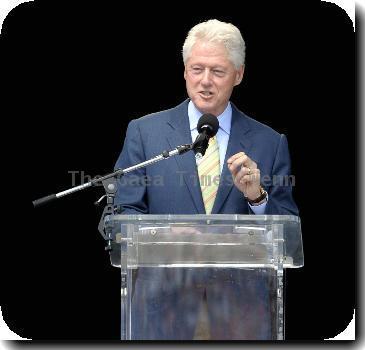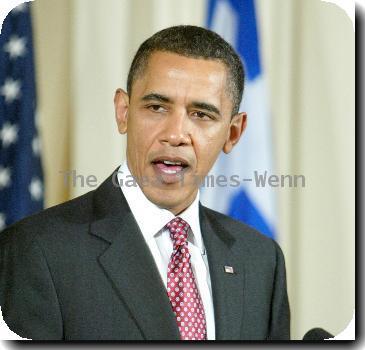Prosecutors charge ex-soldier with threat to kill Obama after hostage standoff at Army base
By Russ Bynum, APTuesday, September 7, 2010
Feds: Army base gunman threatened to kill Obama
SAVANNAH, Ga. — A former soldier accused of demanding mental treatment as he took hostages at gunpoint at a Georgia Army hospital later told investigators he planned to kill President Barack Obama and former President Bill Clinton, federal prosecutors said in court documents filed Tuesday.
Federal charges filed in U.S. District Court in Savannah identified the accused gunman as 29-year-old Robert Anthony Quinones. The Army says he took three hospital workers hostage early Monday in a two-hour standoff at Winn Army Community Hospital at Fort Stewart, 40 miles southwest of Savannah. Army officials say the gunman surrendered. No one was injured.
Federal prosecutors charged Quinones with kidnapping and assault with deadly weapons in connection with the hospital hostage standoff. He was also charged with making threats to kill Obama and Clinton.
An initial court appearance for Quinones was scheduled for Wednesday afternoon.
Quinones’ mother, Janet Gladwell, said she had no idea her son had slipped out of their home in the early hours and gone to the hospital. She said he was medically discharged from the Army months ago because he suffers from post-traumatic stress disorder.
“The reason he was at the hospital the other night was to seek some treatment,” Gladwell told The Associated Press. “He’s been diagnosed as being ill and this was a desperate cry for help.”
Quinones’ mother said her son was diagnosed after serving a 15-month tour in Iraq in 2006 and 2007 with an Army Stryker brigade based at Fort Lewis, Wash. She said he moved to Hinesville, next to Fort Stewart, to live with her after his discharge.
Gladwell declined to discuss her son’s history in detail. She said he did not yet have a lawyer.
But Gladwell sounded stunned to hear prosecutors had charged her son with threatening to kill Obama and Clinton.
“I know nothing about that,” she said. “That’s totally off the wall for him.”
Court documents say Quinones told FBI, Secret Service and Army investigators after his arrest that as part of his assassination plots he had studied Secret Service protocols, sniper techniques and ways to disguise himself and conceal weapons.
Investigators said a search of the suspect’s home turned up at least 15 guns, including high-powered rifles with scopes, as well as books and DVDs on Secret Service protocols, Israeli sniper techniques, Osama Bin Laden and Oklahoma City bomber Timothy McVeigh.
An affidavit by FBI and Secret Service agents who interviewed Quinones, filed in court, says the suspect was asked if he would kill Obama and Clinton given a chance.
“Yes. On a scale of 1 to 10 about being serious, I am a 10,” Quinones responded, according to the affidavit.
The court documents say Quinones was discharged from the Army in February and worked a civilian job at Fort Stewart.
A neighbor, Jerry Franklin, said Quinones worked at one of the post-exchange stores on Fort Stewart. Franklin said he’d last seen Quinones at a neighborhood cookout last weekend.
“Generally, he was really nice — you talk to him and he’s happy,” Franklin said. “If you needed help, he’d help you.”
Brig. Gen. Jeffrey Phillips, a senior Fort Stewart commander, said the former soldier told hostages he needed help for mental problems “connected, I’m quite certain, to his past service.”
The suspect walked into the hospital’s emergency room at about 4 a.m. carrying two handguns, a semiautomatic rifle and a semiautomatic version of a submachine gun, Phillips said. He took a medic hostage and headed to the building’s behavioral treatment wing on the third floor.
An Army psychiatric nurse spotted the gunman and approached him to talk, Phillips said. That nurse was then taken hostage along with a behavioral health technician who refused to allow the gunman through a locked door to the patient area.
Phillips said the nurse, an Army major, was able to start calming the gunman down before Army investigators trained in hostage negotiations arrived and persuaded him to drop his weapons and surrender.
Fort Stewart, the largest Army post east of the Mississippi River, is home to the 3rd Infantry Division. Most of the division’s 19,000 soldiers are deployed to Iraq. It’s the 3rd Infantry’s fourth tour in Iraq since the war began in 2003.
Phillips said he’d seen nothing to indicate the former soldier had previously sought treatment at the Fort Stewart hospital.
Tags: Barack Obama, Bill Clinton, Extortion And Threats, Georgia, Iraq, Kidnapping, Middle East, Military Affairs, Military Legal Affairs, North America, Savannah, United States, Violent Crime







